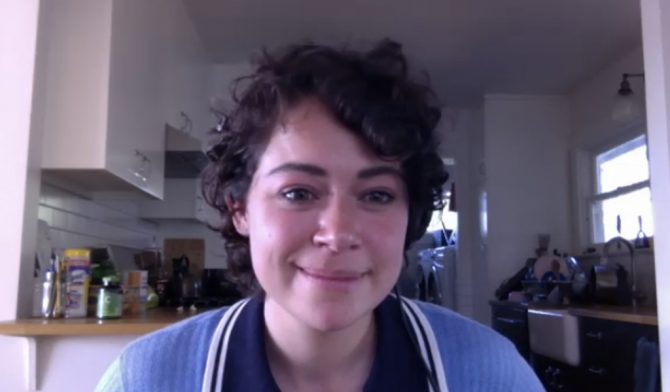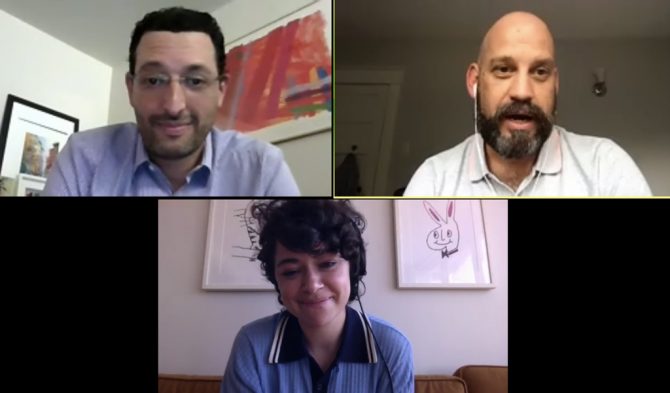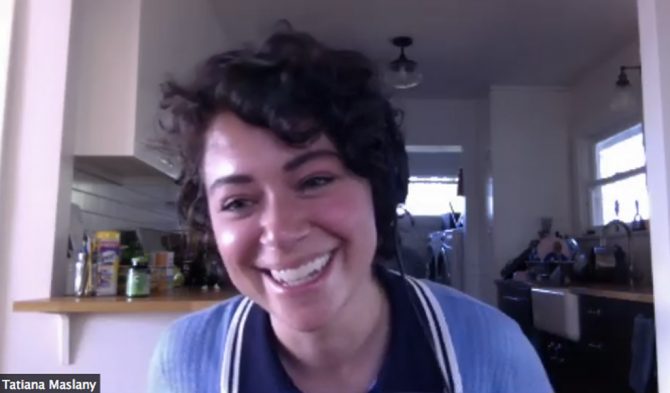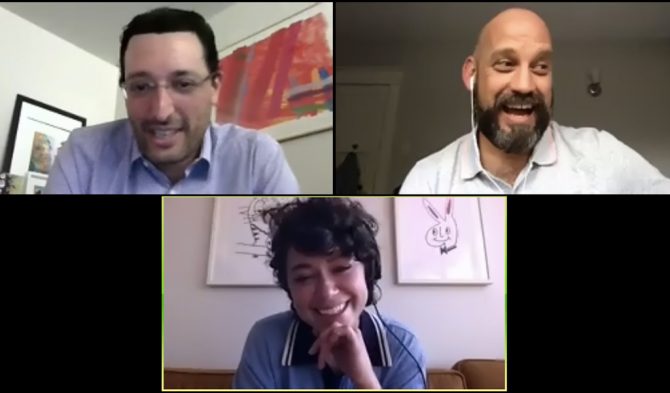Orphan Black Star Tatiana Maslany Shares Acting Insights During Inspirational ‘In Conversation’ Event
“I don’t think there is such a thing as a ‘mistake.’ I don’t think there is such a thing as right and wrong in this job…or in any of the creative jobs. I think there’s only possibilities.”
Emmy-winning Canadian actor Tatiana Maslany recently sat virtually down with Toronto Film School students to offer an intimate glimpse into the highlights, lowlights and insights of her 25-year acting career.
From her discovery in a Regina community theatre production of Oliver! at age nine, to her Emmy Award-winning juggling act playing multiple roles on Orphan Black, to her experience filming HBO’s soon-to-premiere reboot of Perry Mason – Maslany’s candid May 28 guest appearance on Toronto Film School’s exciting new In Conversation speaker series covered all the bases.
Previous guests of the speaker series – which is hosted by Toronto Film School’s Executive Producer in Residence Andrew Barnsley and Writing for Film & TV Program Director Adam Till – have included Academy Award-nominated filmmaker Atom Egoyan, 30-year veteran stand-up comedian Caroline Rhea, Oscar- and Golden Globe-nominated writer and actor Nia Vardalos, and Beverly Hills 90210 star Jason Priestley.
Here’s what Maslany had to say:
On starting her acting career in small town Saskatchewan
“I started when I was nine, and the first job I did was pretty quick on the heels of the first community theatre thing I ever did. There was a casting agent in the audience of Oliver! trying to find kids who could reasonably speak in front of humans in Regina.
“At the time, the film industry in Saskatchewan was thriving…so I sort of fell ass backwards into my first TV job. It was a guest star role on a little series that didn’t do much, but it got me in the door of auditioning. I auditioned constantly in terms of living in a small community. I was auditioning regularly for TV and for film and commercials and voiceover and all of that at a very young age.
“I was always training: I was always in Young People’s Theatre; I was always on stage; I was taking tap, jazz, and ballet classes. After school was always dedicated to basically training. I wouldn’t have thought of it as that then, it was just fun. It was just what I wanted to do and sort of what I’d been encouraged that I was good at, without a lot of thought that this would be my career or anything.”
On making the decision to pursue acting as a career
“I think when I was graduating from high school, the pressure of having something to fall back on was…a real thing. But, unfortunately for me, I couldn’t find anything that I liked or was in any way good at that wasn’t this. I just couldn’t do it, and I still regret that I have zero hobbies or interests outside of acting.
“But yeah, there was for sure pressure, but it’s very possible to have a career in this as long as you’re willing to keep working, keep making things with your friends or the collaborators you’re meeting at film school or wherever – just people who you jive with, who you are inspired by and who challenge you.”
On making the move to Toronto
“When I turned 20, I’d taken a gap year…I’d been applying to a bunch of performing arts schools and film schools, and then decided to move to Toronto to try it. The reason I picked Toronto was that I knew fewer people there. I wasn’t part of a community that I really could have easily fallen into. I’d done a lot of work through the improv community, but I chose to go to Toronto, where I didn’t know as many people and kind of thought I might take a risk and throw myself into something that I’m not super comfortable in. And when I got to Toronto, I started training.”

On when she discovered the craft behind acting
“I think it was when I moved to Toronto and started studying, that’s when I realized how little I knew about technique and how little I knew about the Alexander Technique. I also took Meisner, which was a huge explosion for my brain, even though I’d one a lot of improv. I started taking scene study, and kind of traditional Stanislavski scene study. And I started watching films.
“I saw A Woman Under the Influence and seeing that film, I was, like, ‘Oh my god, this is why I would want to do this, because what she’s (Gena Rowlands) doing there, and what they’re all doing, what they’re making together, it’s so transcendent and so beyond a scene – it’s on another plane. It’s on another level of existence.’ And, for me, that was when I really started to click into the connection to why I wanted to do this. And it was to perpetually to kind of reach for that level of freedom and that level of abandon. Yep, just freedom.”
On playing barrel racer Kit Bailey on CBC’s Heartland from 2008-2010
“Haha! I lied to get that job. I lied. I said I could ride a horse. I was, like, ‘I’ve been on a horse,’ but really, I sat on a horse when I was three. I sat on a horse. I was placed on a horse. It was stationary. When I was three.
“I’m also deeply asthmatic, so super allergic to horses, but I was so desperate for a job, I wanted a job so badly. So, I fully lied for that one. I played a barrel racer, one the most skilled riders. So, there was a lot of stunt doubling happening in that there series. And a lot of anti-histamines.”
On dealing with the ebbs and flows of her acting career
“I got a lot of heat at Sundance (after her 2010 Breakout Performance Award-winning role in Grown Up Movie Star) and everyone was, like, ‘Blah-blah-blah, you’re something worth something because blah-blah-blah’. So, people wanted to sign me, and I did get signed with WME after that. I was with them for maybe a year, but they ended up dropping me, because just nothing was happening with me after that. So, I was in LA, and I’d just been dropped by my agents, and I was just, like, not auditioning for anything, struggling really hard to get anything…
“I think I really believed the hype after Sundance, because it was my first experience with that, and I was, like, sort of blown away and sort of had smoke blown up my ass. I was like ‘Oh my god, this is so exciting! I’m never going to not work again.’ And then the reality sinks in.
“For me, the thing I always come back to – and I think the saving grace of coming from Saskatchewan and being a hard worker – is that you know that you will work again, because you’re a working actor and because you’ll take the small indie that comes your way because it’s a juicy role, or you will get into class and you’ll start working on something new that scares you, or you’ll take a dance class because you’ve never tried that type of dance before. There’s just so many ways to continue to grow. Yes, you can enjoy those moments of outward success or whatever, but ultimately the more interesting thing is what you’re going to do for your artistry next and how you’re going to build that for yourself. No one’s going to give you the chance unless you’re hungry and doing it in your own time.
“I had to go through six months of not working to find Orphan Black and see the value of it, and go ‘Oh my god’ and dive into it, you know?”
On auditioning for Orphan Black
“Orphan Black was the first thing I’d read in so long that was actually, like, so unbelievable to me. I couldn’t stop dreaming about these characters, and I couldn’t stop dreaming about this audition, and I just wanted to get into that room…
“The first audition was for the casting director and her assistant and it was just, you know, theatre sports – change-up-glasses and change-up-posture kind of thing. Then I got the callback, which ended up being the screen test. I rollerbladed to the screen test, because I was so nervous and I was like, ‘I want to feel my blood flowing, I want to feel worked out, I want to feel like I’m breathing.’ And I also kind of liked the idea of showing up sweaty as, like, a ‘fuck you’ to this we-all-have-to-look-a-certain-way thing…
“I remember there were four other women in the audition room and we all had to sit there and be in each other’s presence, knowing that we were all going in to fight for these roles and we’re all signing our life away for this part if we got it. So, yeah, it was a really bizarre, surreal thing, but I just remember having so much fun in that room and I just saying ‘If that’s it, that’s it. I would die to do this, but I’m just glad I got to play, you know?’”

On playing a total of 14 different roles on Orphan Black
“I remember the first meeting I had with John (Fawcett) and Graeme (Manson), who created the show, and we starting to talk about the characters. I think I wrote down a list of things I thought I’d need and said, ‘It’d be great to have a room where I could go and I could do stretches and yoga between characters’ – and they were, like, ‘You’re not gonna have fuckin’ time for that,’ and I was like, “Huh?” Haha!
“Like, there was no time. There was no time. It was finish the scene, walk, cut, print, go – walk out the door into the cold, step into the hair and makeup trailer, get my wig off, go to my trailer, take my costume off, put the new one on, walk back to hair and makeup, breeze through there in an hour, while working with my dialect coach, who’s sitting next to me, or maybe working with my scene partner to run the lines to make sure we’re on the same page. And then you walk on set, and sometimes they’ve already blocked it, because we had to move that quick. Sometimes I’d get to feel the space in a very expedited way, find the blocking, but it was very fast. It was like an athletic feeling.”
On being labelled an “overnight” sensation in the wake of Orphan Black’s success
“It’s bizarre, because you become this ‘overnight’ thing, which is not true…it took 17 years for me to get to that point. And I just think any of those markers of success to ‘you made it’ are just not true. It’s just not true.
“I’m such a firm believer in just continuing to work and excavate and to not rely on those outside accolades to give your work worth. I know that I’ve done stuff in acting classes that I was, like ‘Oh my god, that was, like, uhhh. I just felt so alive and my scene partner was so fuckin’ amazing’ and no one sees that but us in that class.’ But that, to me, is the lifeblood of it all – continuing to dive further into your discomfort, and into your joy, and into your own personal curiosity.”
On winning the 2016 Emmy Award for Outstanding Lead Actress in a Drama Series
“I truly had no idea. Truly zero idea. And, like, so resistant to it, which is why (my speech) was written out on my phone. Like, just no, no idea. Just get me out of there. I mean, it was amazing. It was a trip. But don’t make me talk in front of all those people…
“It’s so weird. You’re sort of sitting in this uncomfortable dress, starving and just nervous through the whole thing. Famous people are everywhere, but also there’s seat-fillers everywhere and people will just come sit next to you because so-and-so left and they need to make it look like an event, so there’s people who are in gowns who are just paid to sit there. Eventually, as the commercials run on, you just stop talking because you’re just, like, get us out of here! But the after-parties are a lot of fun, dancing’s a lot of fun, taking off your shoes is fun.”
On where she keeps her stash of trophies – including an Emmy, six Canadian Screen Awards, two ACTRA Awards, two Gemini Awards, A Gracie Award, a Young Hollywood Award, and a TCA Award
“Ha ha. I just moved out of my place and it’s in a box. It’s in a box in my storage locker. They’re heavy and they’re sharp. They’re unwieldy. I mean, some people put them on shelves. I don’t totally get it. Not my style.”
On hitting the talk-show circuit
“That’s the most nightmarish thing. Those things are so intense, because you do a pre-interview where you have to come up with interesting things to talk about, which is, like, kill me. Then, when you get there, they run you through what the bits are going to be, then you go out and kind of do the bits. It’s not written, but it’s pretty structured. With (Stephen) Colbert or Seth Meyers, there’s a lot of play in it, but with some of them, you’re just talking to a robot…It’s bizarre, it’s bizarre.”

On the importance fostering unique Canadian voices in the film industry
“There’s so many incredible voices coming out of Canada that are young voices. I remember when I saw Xavier Dolan’s work for the first time and was just, like, ‘Oh my god!’ Just this revolutionary vision – so queer, and so out, and so, like, himself, and so of our generation, it was just so exciting to see…
“I think that the embracing of wearing (our Canadian identity) on our sleeve is what’s going to make it even more delicious to other people. If we pretend to be the States, or we pretend to not have our own stories, it’s just not going to ring true in the same way. That’s why the States is so successful, because it’s so unabashedly itself – from wherever people are from, they’re so themselves, right? And I feel like that can only be universal and can only be interesting.
“I think about Don McKellar’s work with Twitch City, which was such a weird show. And my brother was in this show called Four in the Morning that was so cool. It was so different and, like, it’s own thing entirely. And there’s so many gems like that that make me so excited and proud of Canada…
“Kim Nguyen is someone I worked with who’s from Montreal and an incredible filmmaker. Between season 3 and 4 of Orphan Black, I was splitting my time between the States and Canada, but I came back to do that tiny movie (Two Lovers and a Bear) in Iqaluit and we went to Cannes with it. It was a weirdo fuckin’ movie and it was one of the best experiences of my life, no question – and it was fully just the specificity of that script, the weirdness of the voice, which felt so Canadian to me. The location, all of it was just amazing. I loved it.”
On making her Broadway debut opposite Bryan Cranston in Network
“I have to say that Broadway, for me, was one of the hardest ego experiences of my life for so many reasons – in the sense that, every day I went out on stage going, “I don’t deserve to be on this stage. I’m a fraud. The audience becomes a vacuum when I step out there. The reviews are bad. They see all the shitty things I’m doing and they’ve written it all down in print, and I’ve read it back.’
“I mean, it was tough. It was really tough, and yet every day, I had to go out there and go, ‘Alright, let’s see what happens today and let’s focus on using this insecurity or this anger or this indignation or this vulnerability or this whatever and just go out there.’
“I liked to always use something different…we did one show the afternoon of the Women’s March – and, to me, that is deeply important and it resonated through me, and so the whole show, there’s a part of me that was using that – that feeling and that mob of people as some kind of fuel. To me, it’s really about what in that moment is true, and letting that speak.”
On playing Network’s so-called villain, Diana Christensen
“I like the grey in-between. I like subverting expectations. I like having a villain character and finding their soft underbelly, or the opposite. With Diana on Broadway, there’s so much legacy around that character being the iconic villain, but I just never felt her to be that way. I was constantly trying to figure out ‘What am I not getting? Why am I not feeling like she’s a villain?’ and navigating what that was, which I also think was just a lot of seriously dated sexism and ‘how dare a woman have power’ and all of that stuff.”
On the importance of making and growing from ‘mistakes’ as an actor
“I think starting at a young age set me up for a real sense of ‘I better not fuck up, because adults are watching and I want to impress them.’ There was a real power dynamic there that was not positive in terms of being a kid and being on set, which is stuff that I’m still unlearning. So when I do make a mistake or humiliate myself or embarrass myself and feel out of sorts, there is still something where I have to get my ego in check and breathe through it and allow it. And I think that will always be the journey for me: Checking my ego in terms of a mistake or whatever it is.
“Contrarily, I did improv for so many years, which is only mistakes – literally the mistake you make is the scene, is the story, is the game. So, there can be joy in those things, too.
“There’s discovery in mistakes, there’s discovery in doing something and falling on your face. I don’t think there is such a thing as a ‘mistake.’ I don’t think there is such a thing as right and wrong in this job or in my job or in any of the creative jobs. I think there’s only possibilities.”

On working with collaborators who help her grow
“I like finding people who I feel are doing something where I’m not quite there yet – I’m not quite that brave yet, or I’ve never done that and I want to know what that feels like to be opposite that. A lot of the decisions I make in terms of the directors I work with, or the actors I work opposite, or the characters I want to play, is, like, ‘I don’t know if I can do that,’ or ‘I want to explore that’.
“It’s also about finding people who also want to say something that you believe in. I think now that’s really important for everybody – to know what you want to communicate and find people who either support that communication or know more about it or see if from a different perspective.”
On working on HBO’s upcoming reboot of Perry Mason
“I can’t give no spoilies, but I can tell you about it. Matthew Rhys is the best number one I have ever worked with, easily. He worked so hard on that show, and then would fly home to New York on the weekends to be a dad, and was promoting that Mr. Rogers movie (A Beautiful Day in the Neighborhood) and another movie. He is tireless, and so fun, so funny, always present, always playing, abd made the cast and crew just so comfortable. Just really, really exceptional.
“Everyone on that cast was so kind. Everyone was amazing. (John Lithgow) was an absolute treat. The nicest person. Good at everything, and kind of infuriating for that reason. He had a book of poetry that he’d written about Trump, and he drew caricatures for each of the cast.”
On how the COVID-19 crisis will impact the industry moving forward
“Given the situation we’re in right now – where it’s like the crews are going to be something totally different from what we’ve ever faced before – I think we’re going to have to get really creative with stuff. I think that indies and projects that are tiny and finding creative ways to make stuff with a small group of committed people…is going to become a really important tool.”
On what she’d tell 20-year-old self
“Don’t let other people tell you who you are. I think, as actors, as creatives, there’s a lot of malleability and a lot of adaptability that comes as part of our craft and as part of what is beautiful about what we do, but I think sometimes that veers into identity stuff. It can get kind of foggy. And I just think your guts know – your guts know what you want to do creatively, your guts know what you want to say, what you believe to be true, what’s honest. And trusting that gut, I think, is really, really important.”


